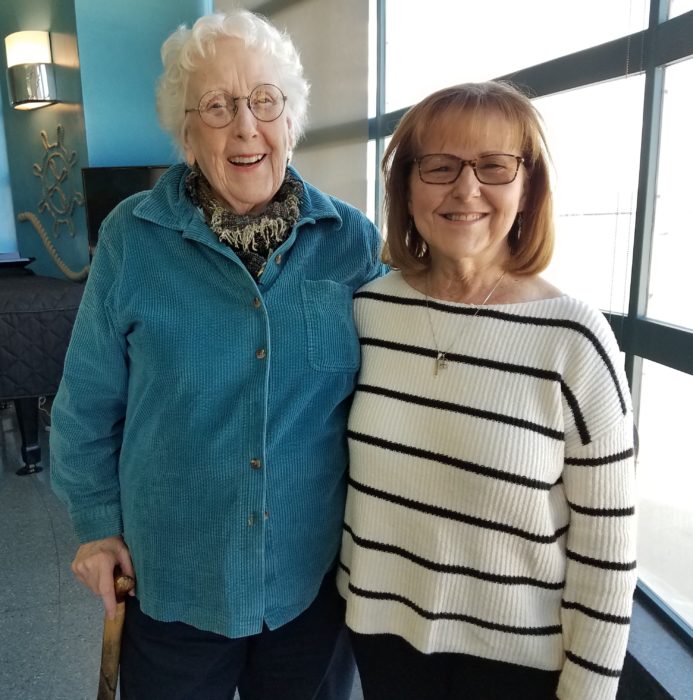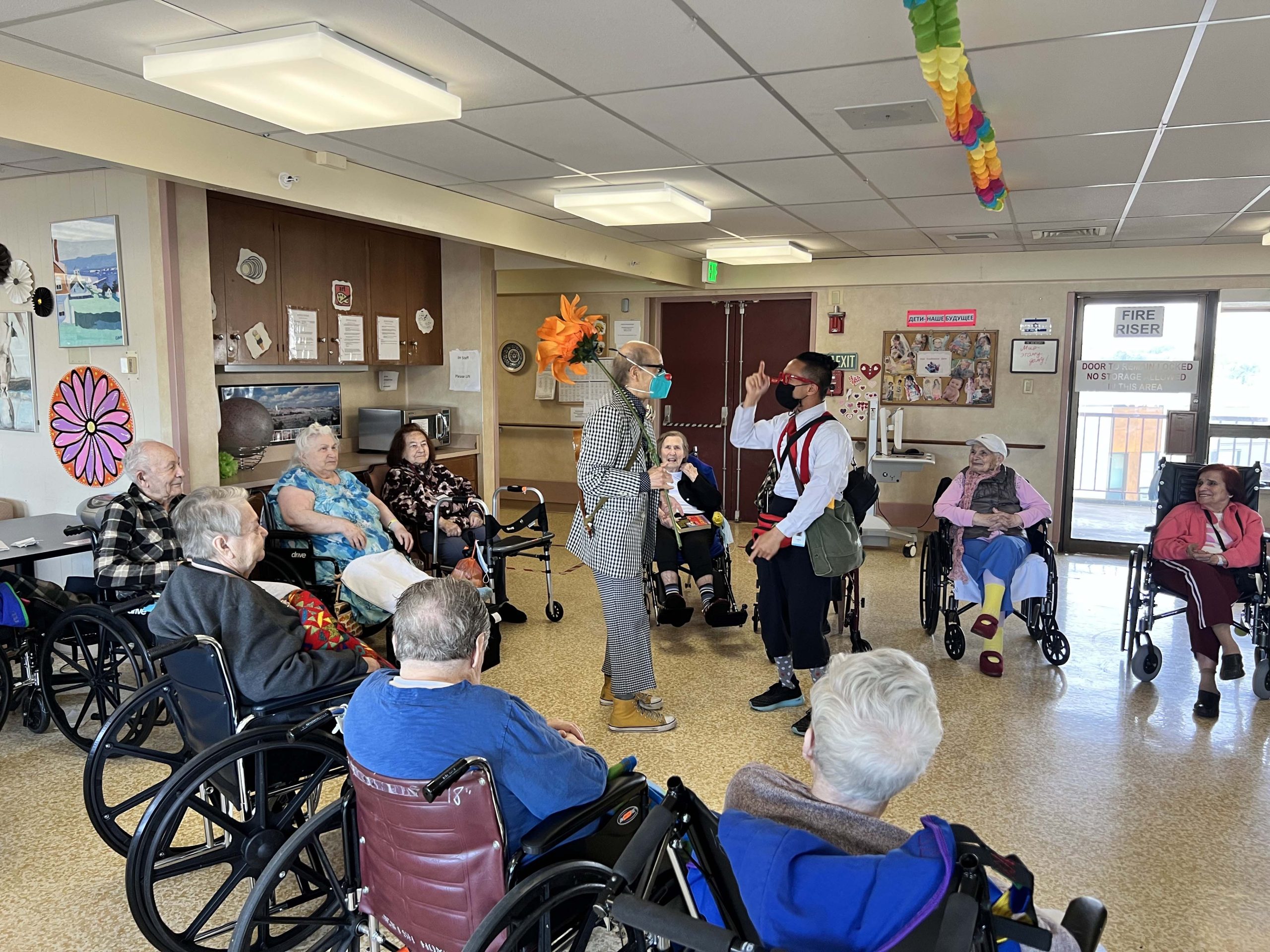Study proves harmonic: Lonely newcomer fills her life with one choir then two
CREATING COMMUNITY – Five years ago, Judi Lewis moved to San Francisco from Nebraska to live with her daughter. It was a big move, and for many months Lewis “spent a lot of time walking around the house, humming.” She was lonely.
“I had left all my friends behind. I was kind of timid and while tried to get to know my neighbors, it wasn’t the same. I wanted to be active and do things, but I didn’t want to always do them by myself.”

Lewis’ daughter was worried. One day her daughter saw an article in the local paper about a choir for older adults at the senior center just around the corner. She suggested her mother check it out.
Although the last time Lewis sang was in high school, she loved music, so she walked over to the Richmond Senior Center and enrolled in the Community of Voices choir study.
It is one of 12 choirs created for a University of California-San Francisco research project studying whether weekly participation in a community choir promotes the health and well-being of older adults. Funded by a grant from the National Institutes of Health, it was conducted in partnership with the San Francisco Department of Aging and Adult Services, and the San Francisco Community Music Center.

CMC’s Older Adult Program was honored in July with a 2019 Aging Achievement Award in the Social Engagement category by the National Association of Area Agencies on Aging.
The choir fit Lewis’s needs so well that she ended up joining a second choir, also in the study.
“Beth Wilmurt, the choir director, introduced us to so many different songs from different lands. She chooses songs that are relevant, that touch our emotions,” said Lewis. “Beth also led a senior choir at Aquatic Park, and friends told me that the center there had a beautiful view, so I decided to join that one too.” Now Lewis sings in two choirs.
But it’s not just the beautiful view or the singing that keeps her going.
“I’ve made new friends. Last Sunday, I had dinner with two friends from the Aquatic Park choir. We get together, we talk. In the summer, when the choir doesn’t meet, some of us come together to sing. “Roger, one of the (Richmond) choir members, organized a Christmas party, and we have birthday celebrations.”
In addition to building her a network of friends, joining the choirs has prompted involvement In addition to singing two days a week, Lewis has become more involved in other activities, like singing with friends and pianos in the park.
Something to look forward to
Lewis’s fellow choir member Jayne Ross moved from Seattle to the Carlisle, a Post Street retirement community, eight years ago. Ross joined the Aquatic Park choir, which started about four years ago.
“It gives me something to look forward to,” she said. “This gets me out of my community, and I get to meet new, different people.”
The Carlisle van brings Ross to Aquatic Park, and then friends from the choir drive her home. While Ross is a member of the Aquatic Park Senior Center, she admits that she doesn’t attend many of their activities. It’s different though with the choir. “It’s never a problem to get there. We have a good time together. Making friends makes you feel better.” Ross also invites members of the Aquatic Park choir to sing with the Carlisle choir when the former is inactive.
Ross’s and Lewis’s experience has mostly confirmed what researchers had anticipated,” said study director Julene Johnson, associate dean for research and professor in the UCSF School of Nursing.
Study finds increased well-being
“We wanted to assess whether singing in a choir reduced feelings of loneliness and increased interest in life,” she said. What they found: “Singing in a choir provides a meaningful, regular opportunity to meet new people, build social support, and increase a sense of belonging.”
Lewis and Ross were among 390 participants, ages 60–92, recruited for the study, which Johnson said was the “largest in the world on the impact of creative arts.” Study participants represented a somewhat diverse group, with 65 percent nonwhite. Over half had never sung in a choir as an adult.
The choirs were led by professional directors and accompanists from the music center. Choral selections were culturally tailored, appropriate for older adults with various singing abilities, and challenging enough to facilitate growth and mastery over time. Public performances provided a focus and enabled family members and the public to enjoy the results.
In reviewing what was learned, Johnson noted a significant percentage of seniors experience loneliness, social isolation, and depression. “We know that staying connected to people is important for maintaining the health of older adults. Unfortunately, our current health and social systems are not prepared to help support our rapidly increasing population of older adults.”
It’s physical, singers agree
Johnson and her research team had hypothesized that participation in the choirs would positively impact the participants’ physical functioning and mental abilities. Johnson admitted she was surprised no significant changes were found. Still, choir members described a feeling of physical improvement.
“I notice if I sing for an hour, I have more energy.”
“I wake up singing.”
“My breathing has improved.”
“I can feel my blood pumping.”
“I don’t feel as depressed.”
A remarkable 92 percent of the participants stayed through the full study. The 12 Community of Voices choirs are now part of the music center’s Older Adult Choir program, and continue to rehearse weekly and perform occasionally. The choirs are free, and open to people 55 and older.
The Community of Voices study also developed a program manual, How to Create a Community Choir for Older Adults.
“We know that singing together is good for you. Now we have research that demonstrates it, and a manual to help others start the program,” said Community Music Center Program Director Sylvia Sherman. “I’m thrilled that the choirs are continuing.”
Responding to requests from the community, the music center has created three new choirs since the study ended in 2017. “If you have the people and you know what kind of music you want to sing, CMC is eager to work with you” Sherman said.
I think Lewis said it best. “Music is the spice of life. Choirs keep the music going.”
For further information on the study, visit https://cov.ucsf.edu/ or call Johnson at 415.476.1106. For information on starting and supporting choirs, or to inquire about the choir manual, contact Sherman at ssherman@sfcmc.org





